William Butler Yeats: Difference between revisions
Jump to navigation
Jump to search
imported>Russell Potter (Just a fresh start on this one) |
imported>Russell Potter (adding categories) |
||
| Line 1: | Line 1: | ||
[[Image:N062238.jpg|thumb|right|400px|William Butler Yeats. Courtesy of the Chicaho Historical Society]] | [[Image:N062238.jpg|thumb|right|400px|William Butler Yeats. Courtesy of the Chicaho Historical Society]] | ||
'''William Butler Yeats''', the greatest lyric poet in English in the late nineteenth and early twentieth centuries, remains a man of enormous contradictions. The nominal leader of the [[Irish literary renaissance]], he spent most of his adult life living in [[London]]; a quiet, sensitive soul, he was a political firebrand who at times seemed to flirt with [[fascism]]; a sometime dabbler in the Occult, he was nevertheless a clear-eyed rationalist when it came to literary matters. Poet, playwright, political activist, and banner-carrier for Irish writers generally, Yeats is perhaps best remembered for his very late poetry, which centered on richly humane meditations on human age and frailty. | '''William Butler Yeats''', the greatest lyric poet in English in the late nineteenth and early twentieth centuries, remains a man of enormous contradictions. The nominal leader of the [[Irish literary renaissance]], he spent most of his adult life living in [[London]]; a quiet, sensitive soul, he was a political firebrand who at times seemed to flirt with [[fascism]]; a sometime dabbler in the Occult, he was nevertheless a clear-eyed rationalist when it came to literary matters. Poet, playwright, political activist, and banner-carrier for Irish writers generally, Yeats is perhaps best remembered for his very late poetry, which centered on richly humane meditations on human age and frailty. | ||
[[Category:CZ Live|Yeats, William Butler]] | |||
[[Category:Literature Workgroup|Yeats, William Butler]] | |||
Revision as of 19:01, 9 June 2007
William Butler Yeats, the greatest lyric poet in English in the late nineteenth and early twentieth centuries, remains a man of enormous contradictions. The nominal leader of the Irish literary renaissance, he spent most of his adult life living in London; a quiet, sensitive soul, he was a political firebrand who at times seemed to flirt with fascism; a sometime dabbler in the Occult, he was nevertheless a clear-eyed rationalist when it came to literary matters. Poet, playwright, political activist, and banner-carrier for Irish writers generally, Yeats is perhaps best remembered for his very late poetry, which centered on richly humane meditations on human age and frailty.
